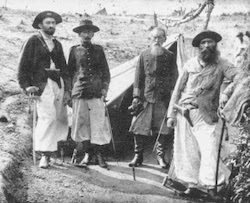 This research area includes projects that are built around the links between the fields of political history, cultural history and art history, but which point to a new approach that goes beyond the traditional perspective consecrated by these matrices, stressing the hybridity of new objects and problems. So-called "English social history" guided the complex linkages between consciousness, experience, cultural production and the struggle for hegemony in society, expanding the often restrictive use of ideology as a historiographical category. On the other hand, the new wave of political history proposes an approach to politics that goes beyond institutional boundaries to formalize the relations of power (state, government, party system and political-ideological movements). The history of gender relations has also been constituted as an investigative and reflective framework that interlinks concerns regarding culture and power relations. These and other theoretical aspects have indicated the need for the creation of objects and problems located in the spaces between political history and cultural history, as delineated in the contemporary historiographical debate. Some examples of this include intellectual history and the history of intellectuals; cultural institutions operating in the context of power and political struggle; artistic and intellectual engagement; propaganda; cultural policies; and socio-cultural movements and their political identities. Based on these approaches and objects, this research area brings together studies that encompass the various dimensions of cultural production interlinked with political games, recognizing that internal inequalities in societies and the power asymmetries that exist between countries and regions imply cultural dimensions both in terms of the exercise of political domination as well as in forms of resistance.
This research area includes projects that are built around the links between the fields of political history, cultural history and art history, but which point to a new approach that goes beyond the traditional perspective consecrated by these matrices, stressing the hybridity of new objects and problems. So-called "English social history" guided the complex linkages between consciousness, experience, cultural production and the struggle for hegemony in society, expanding the often restrictive use of ideology as a historiographical category. On the other hand, the new wave of political history proposes an approach to politics that goes beyond institutional boundaries to formalize the relations of power (state, government, party system and political-ideological movements). The history of gender relations has also been constituted as an investigative and reflective framework that interlinks concerns regarding culture and power relations. These and other theoretical aspects have indicated the need for the creation of objects and problems located in the spaces between political history and cultural history, as delineated in the contemporary historiographical debate. Some examples of this include intellectual history and the history of intellectuals; cultural institutions operating in the context of power and political struggle; artistic and intellectual engagement; propaganda; cultural policies; and socio-cultural movements and their political identities. Based on these approaches and objects, this research area brings together studies that encompass the various dimensions of cultural production interlinked with political games, recognizing that internal inequalities in societies and the power asymmetries that exist between countries and regions imply cultural dimensions both in terms of the exercise of political domination as well as in forms of resistance.

